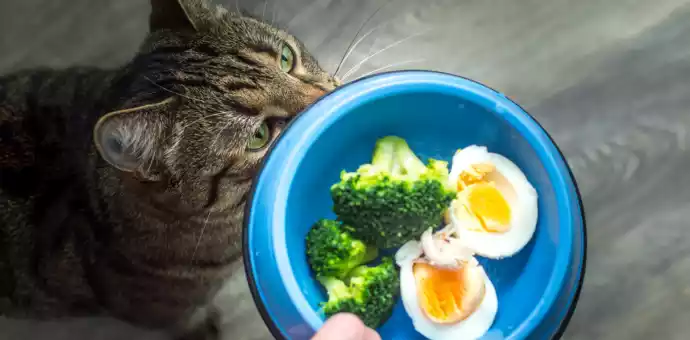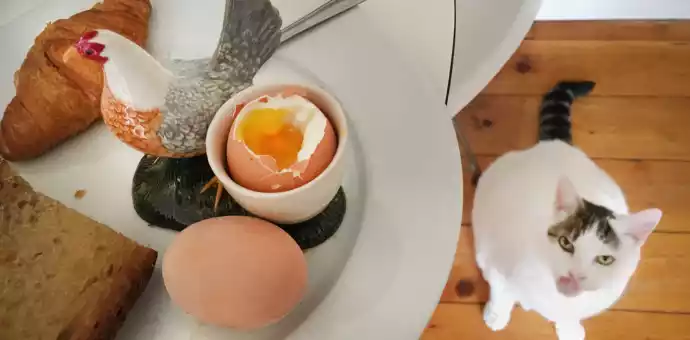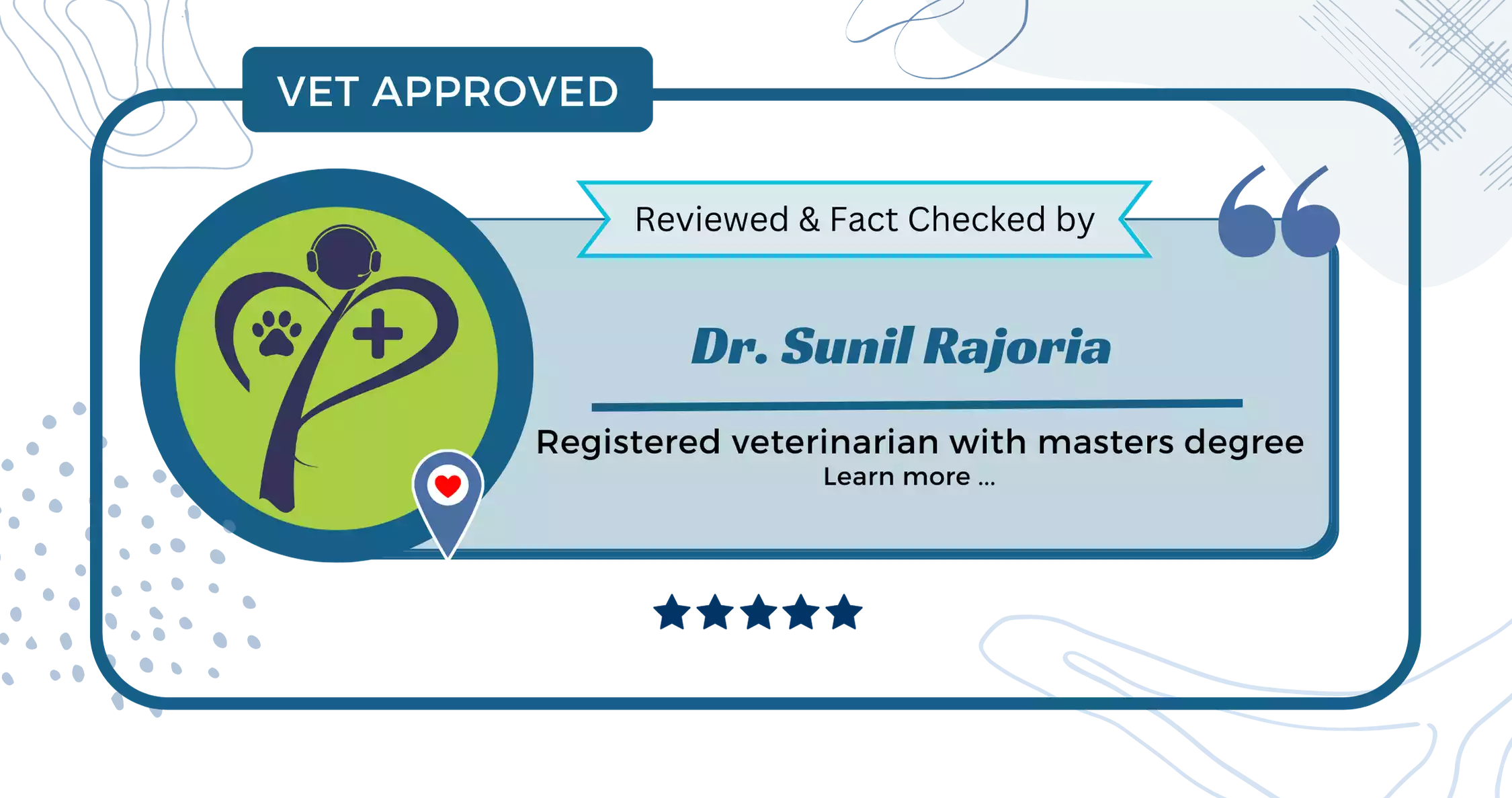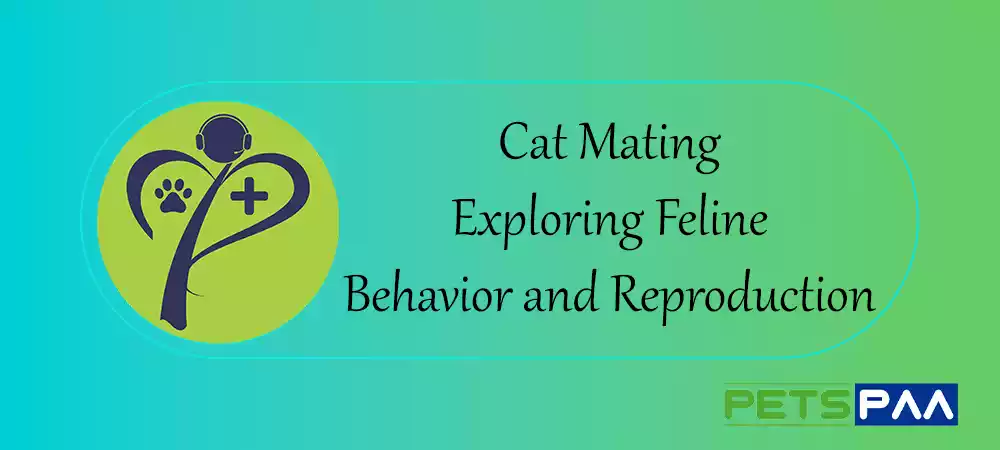Can Cats Eat Eggs? A Guide to Safe & Nutritious Feeding
Can cats eat eggs? A comprehensive guide explores the topic of feeding eggs to feline companions. Eggs offer nutritional benefits such as protein, vitamins, and healthy fats, but there are risks to consider, such as salmonella infection and biotin absorption interference.
Cooking methods and portion control are crucial. Cats should avoid seasoned or additive-rich eggs. Feeding eggs as treats can add variety and encourage eating. However, dietary restrictions, allergies, and kitten considerations must be taken into account.
Eggs should supplement a balanced diet, and veterinary guidance is recommended for individual needs. Moderation and proper preparation ensure eggs can be a nutritious addition to a cat’s diet.
Table of Contents
Introduction
Cats are beloved pets and an adequate diet is critical to their general well-being. A well-balanced diet is critical to their health and vigor. You may be wondering if you can feed eggs to your cat.
We as PetsPaa in this article will give a full guide on feeding eggs to cats, including nutritional advantages, hazards, cooking techniques, portion management, potential allergies, kitten considerations, the importance of eggs in a cat’s diet, and more. So, let us investigate if cats may safely consume this popular human meal.
Can Cats Eat Eggs?
Nutritional Benefits of Eggs
Eggs are considered a “superfood” due to their high vitamin content. They are high in protein, which is essential for muscle maintenance and development in cats.
Eggs also include vital amino acids, vitamins (A, D, E, B12, and biotin), minerals (iron, zinc, and selenium), and healthful fats. These nutrients help a cat’s general health and support a variety of body processes.

Risks of Feeding Eggs to Cats
While eggs provide nutritional advantages, there are certain hazards to be aware of. Salmonella infection can cause serious sickness in cats if consumed in raw eggs or raw egg whites.
Raw eggs also contain avidin, a protein that inhibits biotin absorption, a necessary ingredient for a cat’s healthy skin and coat. As a result, properly cooking eggs before giving them to cats is strongly advised.
Cooking Eggs for Cats
Recommended Cooking Methods
It is important to properly boil eggs to ensure their safety for cats. Cats may eat food prepared without seasoning by boiling, poaching, scrambling, or frying. Any possible germs are eradicated by completely boiling the eggs, making them safe for ingestion.
Avoiding Seasonings and Additives
It is critical to eliminate ingredients such as salt, pepper, onions, or garlic when making eggs for cats. These compounds can be hazardous to cats and cause a variety of health problems. It is important to keep the eggs basic and free of any additives that might harm a cat.

Feeding Eggs to Cats
Portion Control and Frequency
It is critical to adopt portion control when integrating eggs into a cat’s diet. Eggs should be served as a treat or as a complement to their normal meals. As a general rule, one or two tiny pieces of boiled egg per dish are plenty for most cats. It is critical not to overfeed eggs to cats since this might lead to an imbalance in their total diet.
The frequency with which cats are fed eggs varies according to their unique demands and dietary limitations. Consult a veterinarian to establish the right frequency depending on your cat’s individual health issues and nutritional needs.
Including Eggs as Treats
Feeding eggs to cats as treats can give them additional variety and nutritional advantages. You may use little bits of the fried egg as a reward during training sessions or as a special treat on occasion.
This is also a good method for cats with picky appetites because eggs are appealing and encourage them to eat.

Considering Dietary Restrictions and Health Conditions
Before introducing eggs into your cat’s diet, take into account any dietary limitations or health concerns they may have. Cats with certain dietary requirements, such as food allergies or sensitivities, may not tolerate eggs well.
In such circumstances, it is recommended to get specific guidance from a veterinarian on acceptable alternative protein sources.
Furthermore, if your cat has a history of pancreatitis or obesity, you should keep an eye on their fat consumption. While eggs contain healthful lipids, eating too many of them might lead to weight gain or worsen pancreatic problems. Your veterinarian can advise you on the number of eggs to put in your cat’s diet.
Potential Risks and Allergies
Salmonella Infection Risk
Salmonella infection, a bacterial disease that can cause gastrointestinal discomfort, fever, and other serious symptoms in cats, is a danger with raw eggs. As a result, it is strongly suggested that cats not be fed raw eggs.

Interference with Biotin Absorption
Raw egg whites contain avidin, a protein that binds to biotin and hinders its absorption in the body. Biotin is necessary for a cat’s skin, coat, and general health.
Cooking eggs denatures avidin, increasing biotin bioavailability. By feeding cooked eggs, you ensure that your cat receives the biotin content without interruption.
Allergic Reactions to Eggs
Some cats, like people, may be allergic to eggs. Allergic responses might include stomach discomfort, skin irritation, itching, or breathing problems. If you believe your cat has an egg allergy, visit a veterinarian for proper testing and advice.
If this is checked, eggs should be avoided and alternative protein sources should be investigated.
Guidelines for Feeding Kittens
Age-Appropriate Introduction of Eggs
Kittens have different nutritional requirements than adult cats, and their digestive tracts are still growing. In conjunction with a veterinarian, eggs should be introduced gradually. It is usually best to wait at least four months before adding eggs to a kitten’s diet.

Balancing Nutrition with Kitten Food
While eggs can give nutritional advantages to kittens, they should not be used in place of a well-balanced kitten meal. Kitten food is specially designed to suit the nutritional needs of growing cats. Eggs can be used as a supplement or treat on occasion, but they should not be the major source of nutrition for kittens.
The Role of Eggs in a Cat's Diet
Supplementing a Balanced Diet
Eggs may boost the protein and other necessary components in a cat’s diet. They’re strong in protein, vitamins, minerals, and healthy fats. However, it is critical to note that eggs should supplement rather than replace a properly balanced cat food diet.
Variety and Palatability
Including eggs in a cat’s food can increase diversity and palatability. Cats are picky eaters, so offering new flavors and textures might whet their appetite. Adding cooked eggs in little amounts can supply children with new flavors and boost their overall eating satisfaction.

Conclusion
We have looked over the “can cats eat eggs” in this detailed article and in conclusion, we can say that when eggs are served in moderation and fully prepared, they may be a nutritious addition to a cat’s diet.
They provide high-quality protein and important minerals. However, consider portion control, any dietary restrictions or health concerns your cat may have, and the hazards connected to eating raw eggs.
Consult a veterinarian to establish the proper amount and frequency of egg feeding for your cat, ensuring that their entire diet remains balanced and adapted to their specific needs.
FAQs (Frequently Asked Questions)
Cats can eat cooked eggs, not raw. Cooked eggs are nutritious and safe, providing amino acids and healthy fats. Avoid seasoning and consult your vet for allergies or restrictions.
Eggs can be included in a cat’s diet but avoided in those cats who have diarrhea. Eggs may be more difficult to digest and may aggravate their condition. When your cat gets diarrhea, it is advisable to visit your veterinarian for suitable nutritional suggestions.
Individual tastes exist in cats, and some cats may love eating eggs. However, not all cats enjoy eggs. It all comes down to the cat’s taste and preferences.
It is not advisable to serve fried eggs to cats. Most eggs are fried in oil or butter which may be toxic to cats. Furthermore, the high-fat content in fried eggs might be difficult for cats to digest.
While cats may appreciate the flavor of scrambled eggs with milk, it is not suggested to offer them this combination. The majority of adult cats are lactose intolerant and cannot adequately digest milk. It is safer to feed kids scrambled eggs without milk.
It is not advisable to feed cats scrambled eggs with butter. Butter is heavy in fat and might cause gastric problems in cats. It is preferable to serve basic scrambled eggs with no additional additives.
Eggs may be part of a healthy cat diet, but only in moderation. One to two scrambled or cooked eggs per week might be considered a treat for an average-sized cat. You should consult your veterinarian to establish the optimum amount depending on your cat’s specific needs and dietary requirements.







